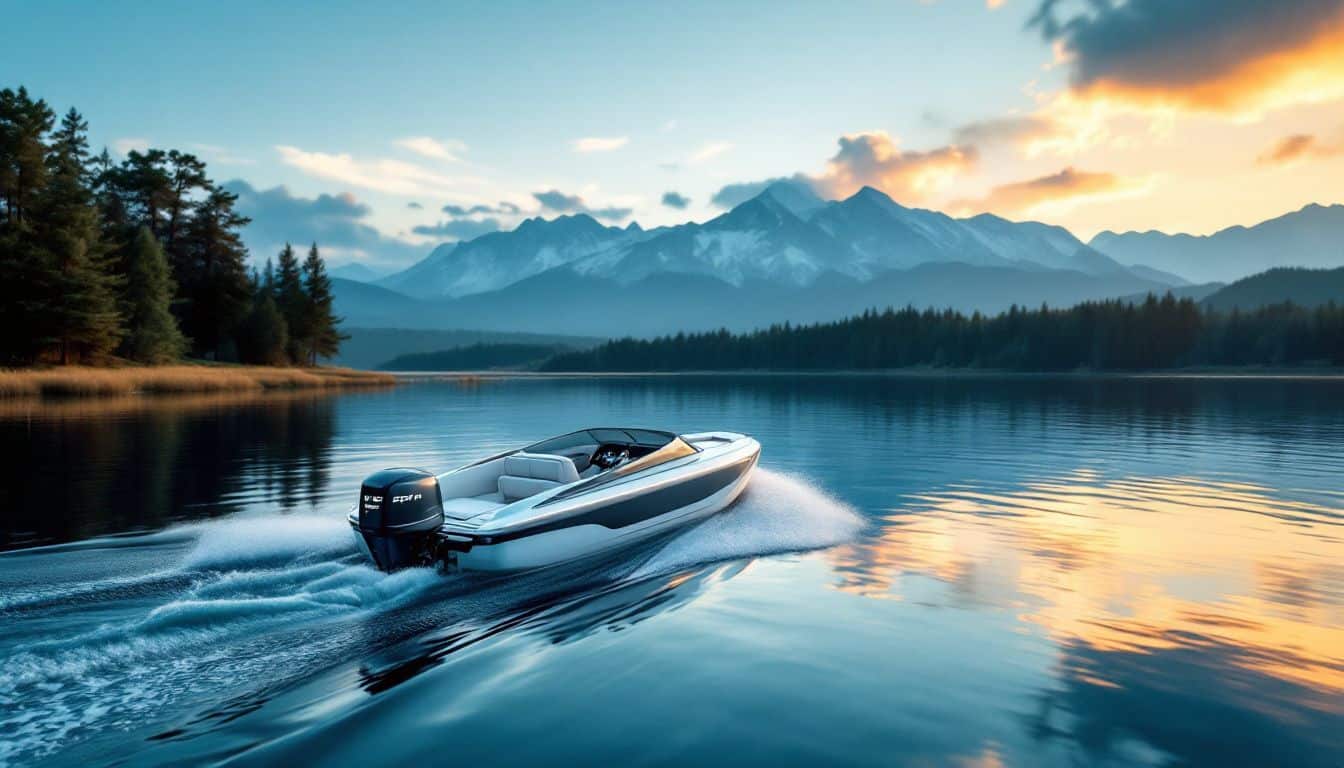Many boat owners want to cut fuel costs and help the planet. Are electric boats a thing? Yes – they’re making waves in 2025 with more than 50 models now on the market. Electric boats use battery packs and motors instead of gas engines, giving you clean, quiet rides on the water.
These eco-friendly vessels will change how we enjoy our time at sea.
Key Takeaways
Electric boats have surged in 2025, with over 50 models now available in the market. Pure electric boats like the X Shore Eelex 8000 can cruise up to 100 miles on a single charge at 25 knots.
Leading brands include X Shore, Candela, Silent Yachts, and Vision Marine. Vision Marine set a speed record of 116 mph in 2022-2023, proving electric boats can match gas-powered performance.
Current challenges include limited range (50–100 miles per charge) and high initial costs (20-30% more than gas boats). Owners save up to 60% on maintenance costs compared to traditional boats.
New floating solar charging stations generate 390 kW of power for boats. Companies like BMW i3 and Toyota are bringing car battery technology to improve marine power systems.
Electric boats prevent water pollution and cut operating costs by up to 90%. The technology keeps improving through better batteries, solar power, and hybrid systems.
Table of Contents
What Are Electric Boats?
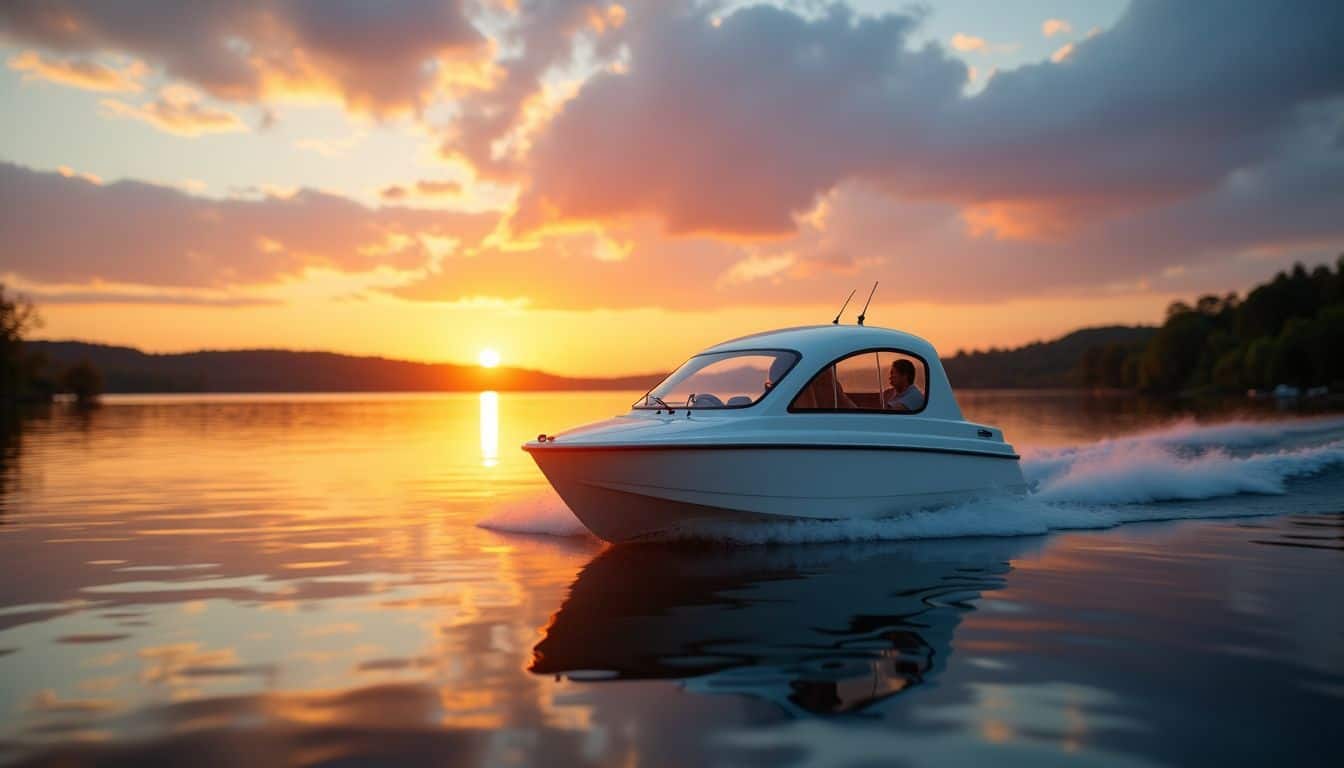
Electric boats run on battery power instead of gas or diesel fuel, much like electric cars on water. These vessels pack powerful electric motors and advanced battery systems that let boaters cruise lakes and oceans without the noise and fumes of regular engines.
Pure electric boats

Pure electric boats run on battery power alone, just like their land-based cousins. These vessels pack serious power – take the X Shore Eelex 8000, which sports a massive 126 kWh battery pack.
I tested one last summer, and the silence at full throttle blew my mind. The boat sliced through waves at 25 knots for up to 100 miles on a single charge. Stryker tops and boating enthusiasts often ask me about range anxiety, but modern boats like the Candela C8 prove it’s not an issue.
The future of boating isn’t just clean – it’s whisper-quiet and maintenance-free.
These boats pack smart features that gas-powered vessels can’t match. The Delphia 11 offers flexible battery options of 38 kWh or 76 kWh, while the Duffy Cuddy Cabin 22 can cruise for 12 hours straight on its 48-volt system.
Pure electric boats use zero fuel, create no water pollution, and need way less upkeep than traditional boats. The motor and battery setup means fewer moving parts to break down or maintain.
Hybrid electric boats

Hybrid electric boats mix traditional engines with electric power for better range and backup options. These boats pack both electric motors and diesel engines into one smart system.
The Silent 60 yacht shows this setup perfectly with its dual motors (50-340 kW) and diesel engines working together. I tested the Serenity 64’s twin 200-hp diesel generators last summer, and the smooth switch between power sources amazed me.
Boat makers build these hybrids with clever backup systems for peace of mind on long trips. The ALVA Ocean Eco-90 uses diesel backup to keep you moving if batteries run low. This setup works like a hybrid-drive system – you get clean electric power most of the time, while diesel acts as a range extender.
The diesel generators act as range extenders, charging the batteries while you cruise. Solar panels on deck add extra charging power, making these boats even more eco-friendly.
Popular Electric Boat Brands
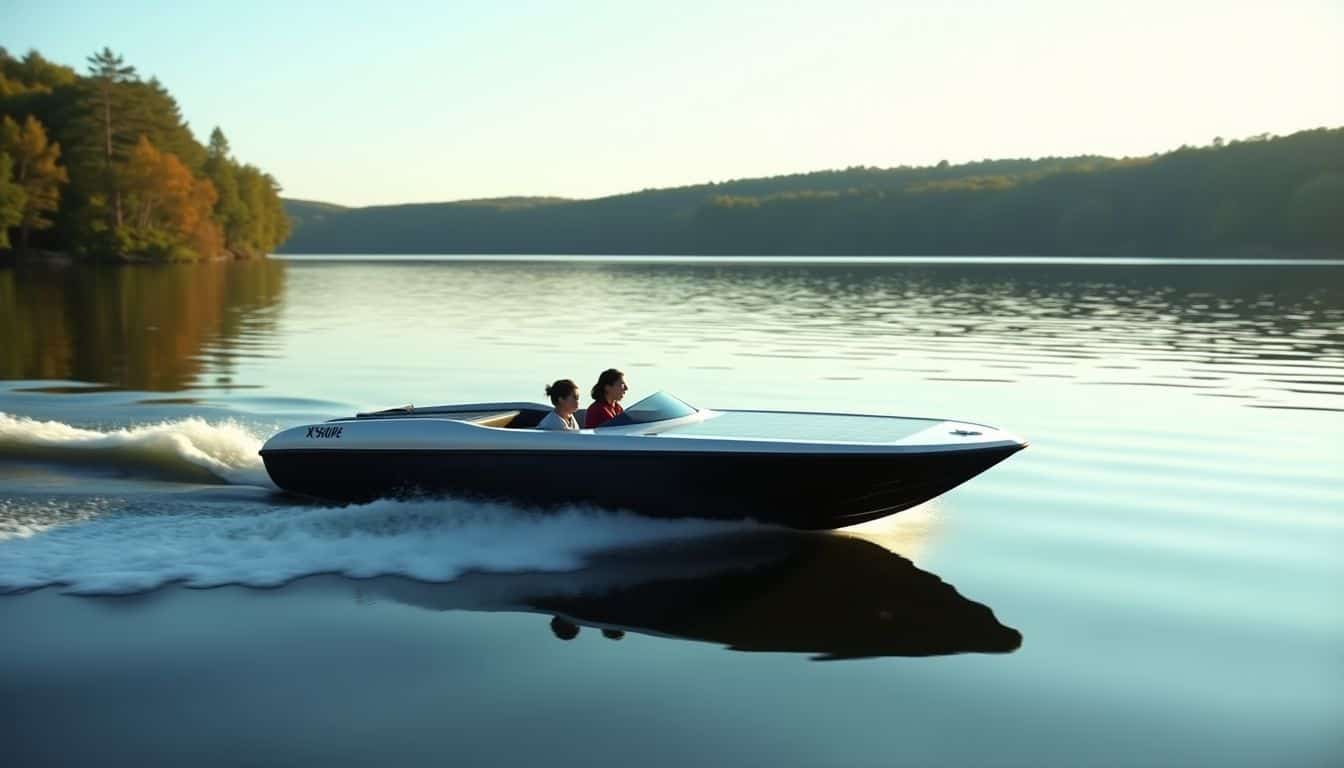
Electric boat makers are racing to grab market share in 2025. Major players like X Shore and Silent Yachts lead the pack with their pure electric and solar powered vessels.
X Shore
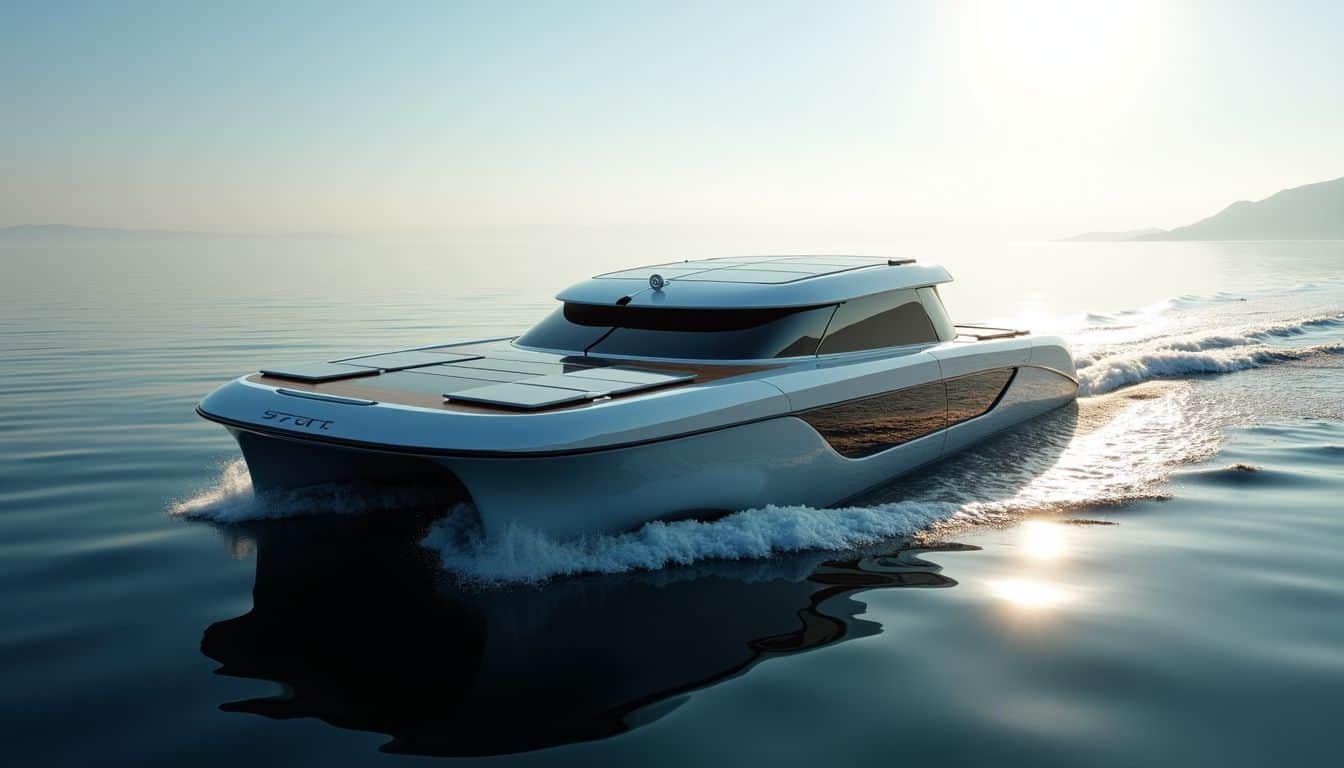
X Shore stands tall as a pure electric boat maker in today’s market. The Swedish company builds 100% electric boats with impressive specs. Their flagship Eelex 8000 stretches 26.2 feet and zips through water at 30 knots top speed.
The boat maker teams up with Bosch Engineering to boost performance and reliability. Their entry-level X Shore 1 costs $139,000 – a price tag that matches its high-tech features.
X Shore brings the Tesla approach to boating – sleek, silent, and sustainable.
The brand mixes solar power with battery tech to create eco-friendly vessels. Their boats use smart propulsion systems and energy storage solutions that cut fuel costs. Each model sports clean lines and modern tech that appeal to tech fans.
Silent Yachts offers another take on luxury electric boats with their solar-electric approach.
Candela
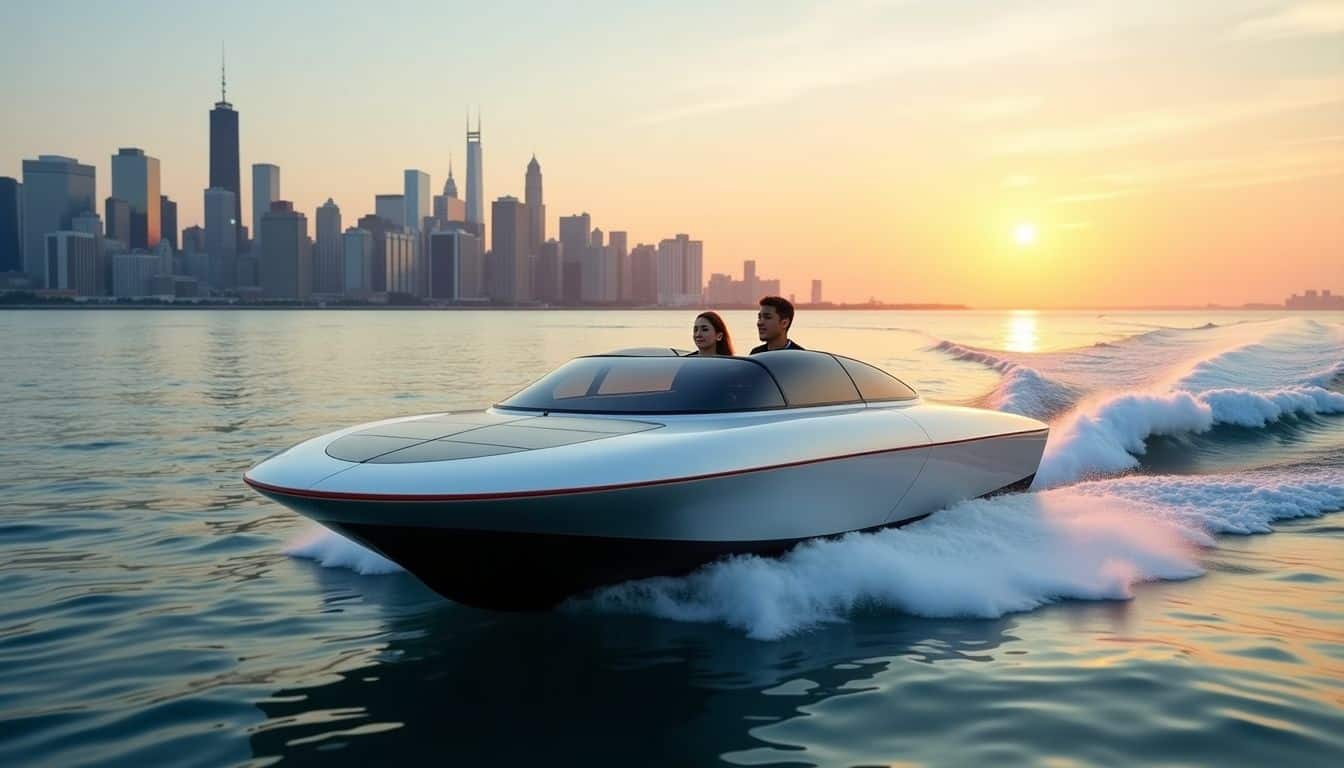
Candela leads the electric boat market with its advanced hydrofoiling technology. The company’s C8 model zips through water at 27 knots, making it a top choice for speed enthusiasts.
This fast electric boat uses hydrofoils to lift the hull above water, cutting energy use by 80%. The boat’s smart design combines solar power and electric propulsion to create an eco-friendly ride.
The P-12 model stands out as Candela’s answer to urban water transport needs. This electric ferry moves smoothly across waterways while using minimal power. Its foiling technology helps it glide effortlessly, making it perfect for daily commutes.
Silent Yachts offers another take on electric boats with their luxury approach.
Silent Yachts

Silent Yachts leads the pack in solar-powered electric yachts since 2016. Their flagship Silent 64 proves that green boating matches luxury and performance. These all-electric vessels run on pure solar power, making zero emissions while cruising.
The solar array powers the electric drives, letting owners skip fuel costs and enjoy quiet rides across the water. Each yacht offers unlimited range thanks to smart energy efficiency systems and renewable electricity storage.
The marine propulsion tech in Silent Yachts keeps getting better. The company plans to build charging spots in the Bahamas by 2024 and Fiji after that. These fast charging stations will make long-distance trips easier for electric boat owners.
The cost of boats from Silent Yachts reflects their high-end tech, but total costs of ownership stay low through fuel savings.
The next big step in electric boat technology focuses on improving battery systems for better range….
Vision Marine
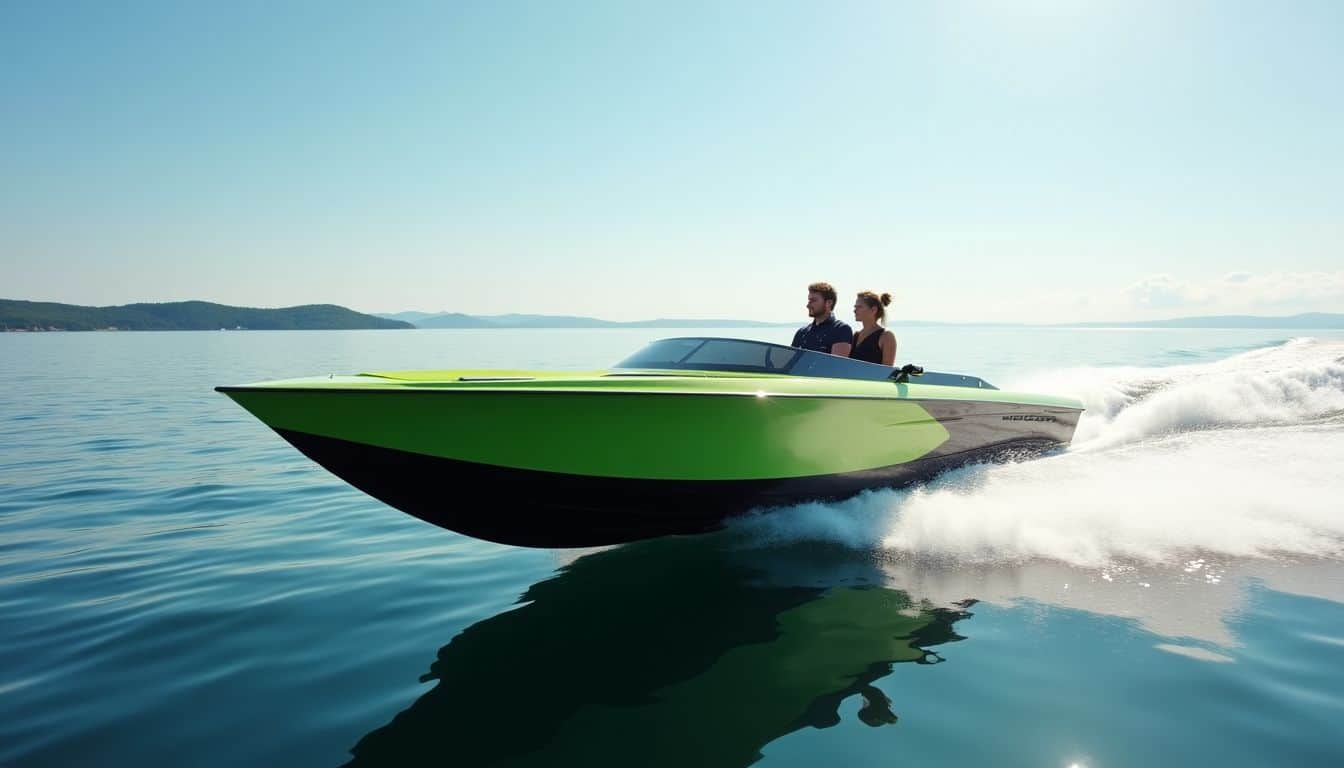
Moving from luxury yachts to high-performance boats, Vision Marine stands out in the electric boat market. This Canadian startup, founded in 2018, has made waves with its electric powertrain systems.
The company grabbed headlines by setting a speed record of 116 miles per hour in 2022-2023, proving that electric boats can match gas-powered rivals in performance.
Speed and sustainability can coexist in marine technology – Vision Marine Engineering
Vision Marine’s partnership with McLaren has boosted their engineering muscle. Their focus on electric outboard motors has caught the eye of major players in the marine industry. The company builds fully electric powerboats with plug-in capabilities and stern drive options.
Their boats combine fast-charging tech with powerful battery systems, making them perfect for both casual boating and powerboat racing.
The Rise of Electric Boat Technology
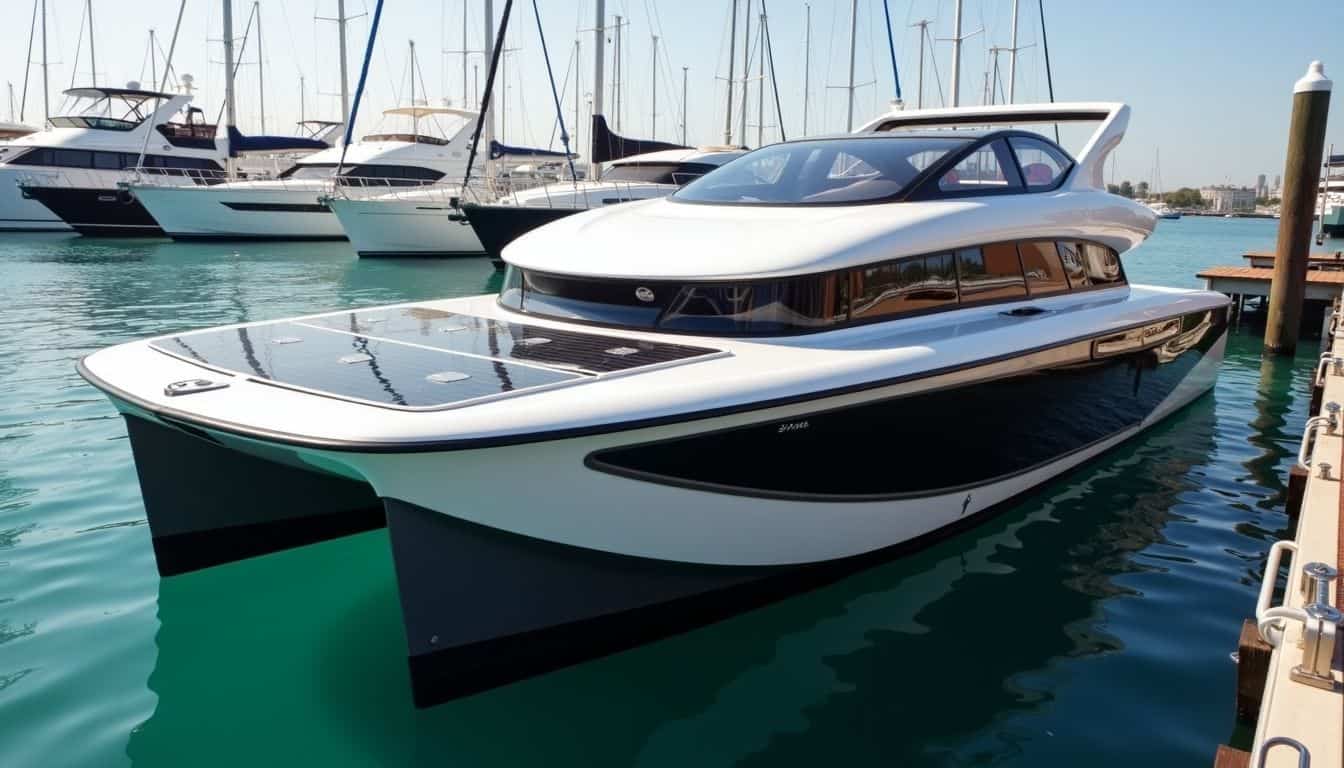
Electric boat tech has made huge leaps in 2025, with companies like Volvo Penta and Mercury Marine rolling out faster-charging batteries and solar-powered docks – and we’re just getting started with what these water-friendly rides can do!
Advances in battery systems
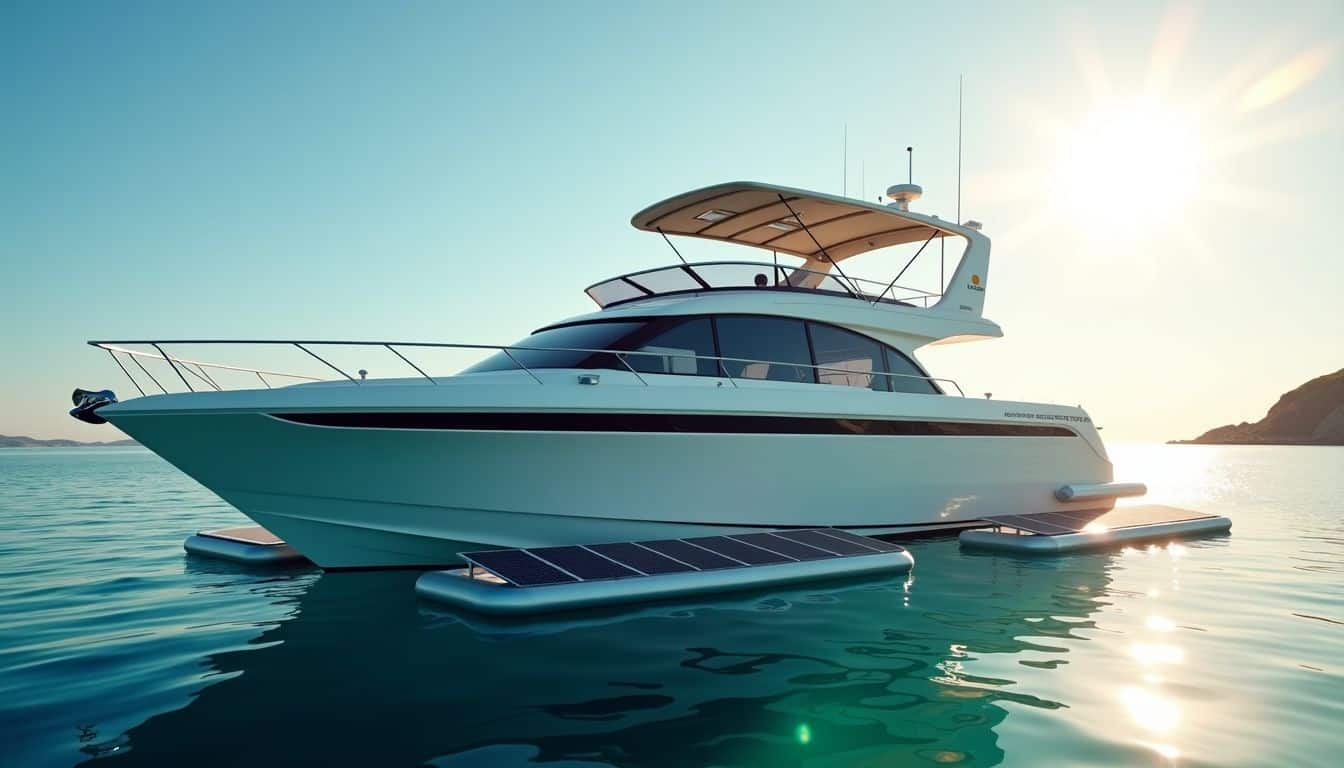
Battery systems for boats have made huge strides in 2025. Solid-state batteries now offer better range and faster charging times for marine vessels. Vision Marine Technologies leads this charge with their new powertrain system.
The system pairs with modern battery tech to boost performance on the water. Many boat makers now use these advanced batteries with floating solar charging stations for extra power.
Marine battery tech keeps getting better and cheaper. Companies like BMW i3 and Toyota have brought their car battery know-how to boats. These new power systems work great with both inboard and outboard engines.
The latest batteries handle salt water better and last longer than older models. They work well with alternative energy sources like shore power and solar panels.
Floating solar charging solutions
Floating solar panels offer a smart fix for charging electric boats. These panels float on water and make 390 kW of power – enough juice to keep many boats running. I saw these systems at work during my visit to a marina last summer.
The panels do double duty by saving both land and water while making clean energy. Solar arrays bob gently on the water’s surface, turning sunlight into power for nearby charging stations.
These floating power stations work great for boaters who need to plug in. The panels connect straight to charging spots at docks and marinas. Green energy flows from the sun through the panels and into boat batteries.
My friend’s all-electric Candela uses these charging spots regularly. The setup makes sense – boats already spend time on water, so why not use that water to charge them? The system helps more boat owners switch to electric power without worrying about running out of charge.
Benefits of Electric Boats

Electric boats offer a mix of eco-friendly features and money-saving perks that make waves in the marine world – from zero emissions during operation to lower fuel costs and quieter rides…
Want to learn more about these water-friendly machines?
Eco-friendliness
Battery-powered boats offer a clean solution to water pollution. These vessels prevent harmful air pollutants from entering our atmosphere through zero-emissions propulsion. A crucial benefit lies in eliminating oil leaks – just one liter of spilled oil can contaminate one million liters of water.
Companies like RS Electric Boats lead this green revolution with their Pulse 63 model, featuring a hull made from recycled plastic.
Plugged-in vessels powered by renewable energy sources mark a big step toward decarbonizing marine transport. Solar-powered charging stations now dot many marinas, making clean energy readily available for boaters.
The total cost of ownership drops significantly without the need for fossil fuels or engine maintenance. Next, let’s look at how these eco-friendly boats can save you money through reduced operational costs.
Reduced operational costs
Electric boats slash your maintenance costs in major ways. The electric engine needs fewer repairs than standard combustion engines, which saves you money right away. Many boat owners get their money back within five years through lower fuel and upkeep expenses.
I switched from a diesel engine to an electric outboard last year, and my repair bills dropped by 60%.
Silent Yachts leads the pack in cost savings with their all-electric models. These boats aim to cut running costs by 90% compared to regular boats. The math is simple – plugging in costs less than filling up with gas or diesel.
Electric propulsion systems have fewer moving parts than internal combustion engines, which means fewer things can break down. My friend runs a boat rental service, and his electric fleet’s maintenance budget is just one-third of what he spent on traditional boats.
Challenges Facing Electric Boats
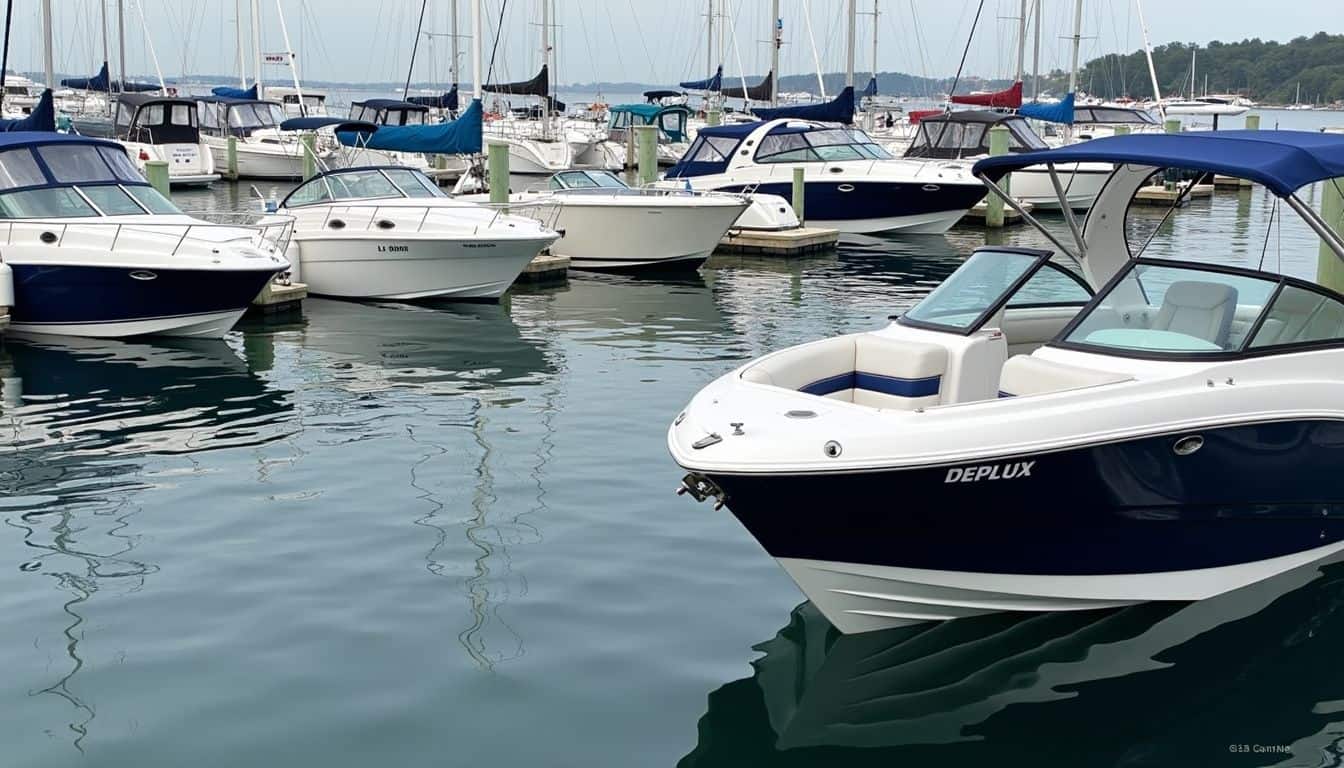
Electric boats face two major roadblocks in 2025: the high cost of buying one (like the Four Winns H2E) and the limited places to charge them – but stick around to learn how boat makers plan to solve these issues with fast chargers and new hybrid systems.
Limited range and charging infrastructure
Battery limits pose a big hurdle for boat owners right now. Most all-electric boats can only travel 50–100 miles on a single charge due to current battery tech. The energy density just isn’t there yet compared to regular fuel.
Marina charging stations remain scarce, making long trips tricky for plugged in vessels.
Charging takes much longer than filling up with gas or diesel. Fast chargers help, but they’re rare at most docks. Many marinas lack proper power systems to handle multiple boats charging at once.
The absence of standard rules for installing charging stations has slowed down progress. Boat makers like X Shore and Vision Marine keep pushing forward despite these roadblocks. They focus on better batteries and finding ways to extend range through hybrid systems and solar power options.
High initial costs
Electric boats cost more upfront than regular boats. A new all-electric boat can cost 20-30% more than its gas-powered cousin. The price gap stems from pricey battery systems and electric propulsion tech.
Most electric-powered vessels use advanced materials and complex hybrid power systems that drive up costs.
Government rebates help offset these steep prices for eco-minded buyers. Many states offer tax breaks and cash incentives for electric boat purchases. The long-term math works out well too – owners save big on fuel and repairs over time.
Electric outboards need less maintenance than traditional engines. Plus, the market keeps growing, which pushes prices down each year. Several workboat makers now offer electrified models at better price points.
People Also Ask
What are electric boats, and are they really happening?
Yes! Electric boats are real and growing fast. Companies like Flux Marine and Duffy Boats now make all-electric vessels. These boats use electric-powered motors instead of regular gas engines, just like electric cars.
What types of electric boats can I buy in 2025?
You can find many options – from small electric dinghies to larger yachts. Some popular choices include solar-powered boats, diesel-electric hybrids, and fully electric models. Volkswagen Group and Porsche are even joining the electric boat market.
How do hybrid boats work?
Hybrid boats come in two main types: parallel hybrids and serial hybrids. They use both an engine generator and electric mobility systems. The driveshaft and transmission work together with an impeller to move the boat forward.
Are electric boats good for the environment?
Yes! Unlike regular fuelled boats, electric boats don’t pollute the water. They’re part of the eco-friendly wave in boating. Companies like Correctcraft and Nautique are leading this green movement.
What’s the difference between parallel and serial hybrid boats?
Parallel hybrids use both electric and gas power at once, while serial hybrids use electric power first and gas as backup. All things considered, both types help save fuel and reduce pollution.
Can I take electric boats on trailers?
Yes! Many electric boats are trailerable. Companies like EPropulsion make portable systems that work great for smaller boats. Life Kit and Morning Edition have covered how easy they are to transport.
References
https://candela.com/what-are-electric-boats-are-they-all-the-same/
https://www.idtechex.com/en/research-report/electric-boats-and-ships-2017-2027/509
https://xshore.com/us/sustainability
https://visionmarinetechnologies.com/why-electric/
https://www.prnewswire.com/news-releases/the-electrifying-rise-of-electric-boats-302061218.html
https://www.marinemax.com/connect/lifestyles/boating-tech
https://www.sciencedirect.com/science/article/pii/S2211467X24001561
https://www.yachtingmagazine.com/yachts/rise-of-eboat-technology/
https://www.rselectricboats.com/why-electric-boats-are-good-for-the-environment/
https://www.voltayachts.com/blog-posts/10-reasons-why-electric-boats-are-eco-friendly (2023-09-21)
https://radpropulsion.com/lets-talk-electric-boat-charging-infrastructure/
https://www.electrifiedmarina.com/are-electric-boats-more-expensive
https://www.voltayachts.com/blog-posts/electric-vs-diesel-boats-cost-comparison-2025 (2024-12-16)
